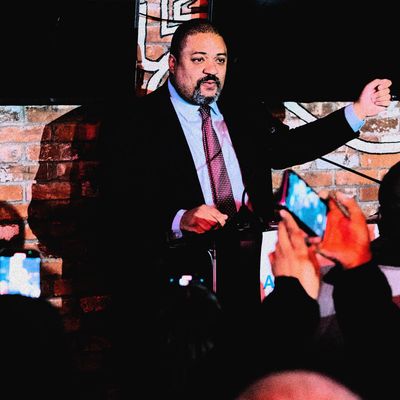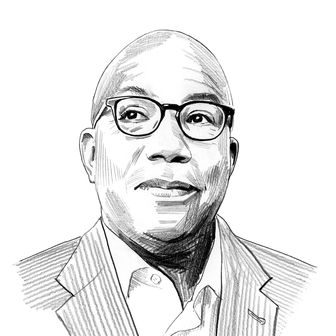
Alvin Bragg, the newly elected Manhattan district attorney, is being attacked on an almost daily basis for doing exactly what he promised voters: moving away from using arrest, prosecution, and jail (or the threat of it) as the primary, default strategy for dealing with low-level crimes and disorder.
It’s a painful but necessary dispute. If Bragg doesn’t buckle, and if the current surge in street crime recedes, New York could move closer to the holy grail of becoming safer and more fair at the same time.
For months on the campaign trail, Bragg told voters — at candidate forums, in debates, and in televised interviews — that on day one of his administration, he would issue a memo instructing the hundreds of prosecutors in the DA’s office to avoid seeking jail time for offenses like fare-beating, shoplifting, soliciting prostitution, possession of small quantities of weed, and the always handy catchall of disorderly conduct.
The general idea, championed by Bragg and a number of so-called “progressive prosecutors” around the country, is to clear the docket of court-clogging lower-level offenses, thereby freeing up police and prosecutors to focus on serious problems like gang activity, gun trafficking, and domestic violence.
Bragg also promised to make minor but important changes to how certain crimes were charged. Resisting arrest, he promised, would have to be tied to an actual arrest, not prosecuted as a stand-alone offense. (Think about it: If a person isn’t being arrested, why prosecute them for resisting that non-arrest?)
More controversially, Bragg believes that not all crimes involving a gun should be treated the same. That stance stems from a case, which Bragg frequently mentioned on the campaign trail, involving his brother-in-law, who as a college student got into a fistfight. “No weapons were drawn. Unlike the policing of white students in these instances, he and all of his friends involved in the fistfight were arrested,” Bragg recounted on his campaign website. “Upon arrest, it was discovered that one of the boys had a gun, and ALL of the boys were charged with possessing the gun.”
Bragg’s arguments and his calm, earnest demeanor — along with the solid turnout of voters in his native Harlem — carried him to victory in the primary and general elections. And shortly after being sworn in, he issued the promised memo.
At which point all hell broke loose.
The New York Post dedicated no fewer than five cover stories to screaming headlines and scathing editorials. “You’ve ordered your prosecutors to stop seeking prison sentences for nearly all crimes, and to charge many felonies as mere misdemeanors. That’s giving criminals the green light, plain and simple,” the tabloid’s editorial board wrote.
The resisting-arrest part of Bragg’s memo was particularly alarming to the NYPD. Keechant Sewell, the newly installed police commissioner, issued a memo of her own to the 36,000 uniformed members of the department, expressing concern about Bragg’s ideas. “I have studied these policies and I am very concerned about the implications to your safety as police officers, the safety of the public and justice for the victims,” she wrote.
Bragg and Sewell had a fence-mending meeting “to discuss issues of mutual concern” and issued a joint statement agreeing to continue a dialogue. But the Detectives’ Endowment Association, the union representing active and retired detectives, sent a letter to Governor Kathy Hochul, calling on her to appoint a special prosecutor to oversee Bragg’s work.
“Mr. Bragg’s philosophy on letting these things go unprosecuted is not going to work in my opinion, and I think that we’re putting the public in harm’s way,” said Paul DiGiacomo, president of the detectives union. “I understand the concept — no one wants to see a young man or a young child in jail for a crime that doesn’t warrant it,” he told me. “But when you’re resisting arrest and you’re being confrontational with the police, it’s going to create a public-safety hazard for the police department.”
Republican representative Lee Zeldin, who is running for governor, went after Bragg on Twitter, attacking what he called a “terrible, soft on crime agenda.” Zeldin’s Republican rival, Andrew Giuliani, went a step further, launching an online petition to recall Bragg, even though New York has no mechanism for the popular recall of an elected prosecutor.
Everybody should stop and take a deep breath.
Bragg acknowledges that he got off to a clumsy start — “our rollout was not what it could have been,” he told me — but the people who are complaining now have nobody to blame but themselves. For months, Bragg and seven other candidates for the Democratic nomination waged a lengthy, spirited campaign in which the idea of dialing back aggressive prosecution was the leading issue.
It was clear by June of last year that the office was likely to see major reforms; at times, the race seemed like a competition to see who was promising to exempt the most crimes from prosecution.
Bragg, like other candidates, vowed to continue a process started by longtime DA Cy Vance to dramatically dial down the number of prosecutions, especially when it came to lesser offenses. Overall, the number of cases brought by the office fell by 60 percent under Vance, according to the office’s data dashboard — and during all but the last two of those years, crime also fell precipitously to the lowest levels in decades.
And that’s the point. New York has already proved that reform measures don’t automatically lead to spikes in crime. But a chorus of naysayers are saying what they always do: that Gotham is perpetually on the verge of collapsing into a crime-ridden hellhole.
“This is the same exact stuff that my father went through in 1972,” said Keith Wright, the longtime chairman of the Manhattan Democratic Party and the son of Bruce Wright, a legendary judge who was excoriated by the tabloids and police unions for following the letter of the law and refusing to impose crushing bail requirements, even on defendants charged with heinous crimes.
“My father became known as ‘Turn ’Em Loose Bruce,’ and he could be looked at as the father of bail reform in a lot of ways,” said Wright, who once lived down the hall from Bragg in Harlem’s Esplanade Gardens apartments. “This is the same exact issue, and Alvin is going through the same exact firestorm — maybe not as personal, but it’s very reminiscent of that.”
Bragg says he intends to stay the course.
“Public safety is paramount to my job. That’s what I go to sleep thinking about. It’s what I wake up thinking about,” he told me. “I don’t hear people talking about disorderly conduct or other things like that. But I do hear them talking about assaults and domestic violence and guns. So let’s shift the resources to what people are talking about: real, significant public-safety concerns.”
The coming months are going to be noisy, passionate, and loud. But it’s exactly the debate about crime and justice New York needs to have.
More of the City Politic
- New York City’s Next Mayor Needs You
- How Desperate Will Eric Adams Become to Woo Trump and Get a Pardon?
- Finding Jordan Neely






























